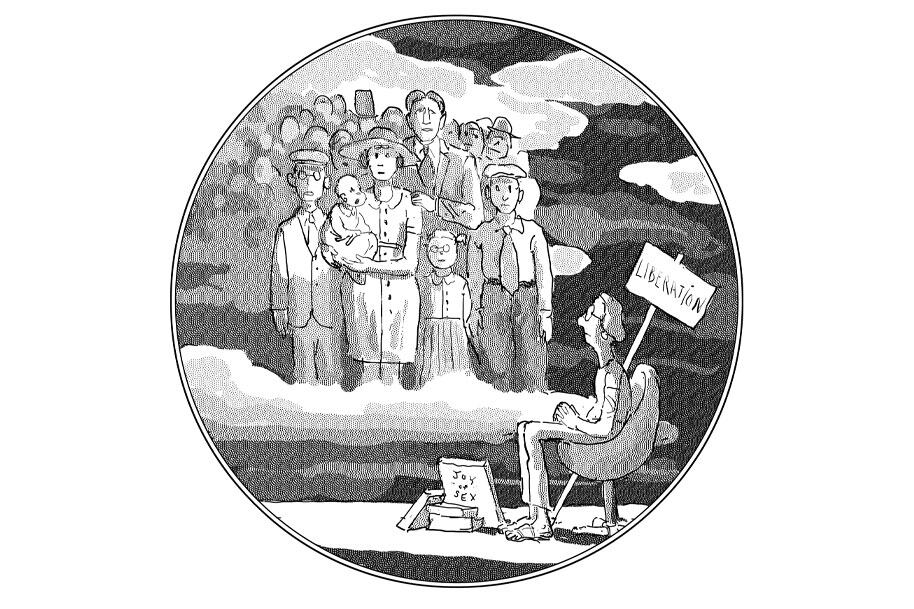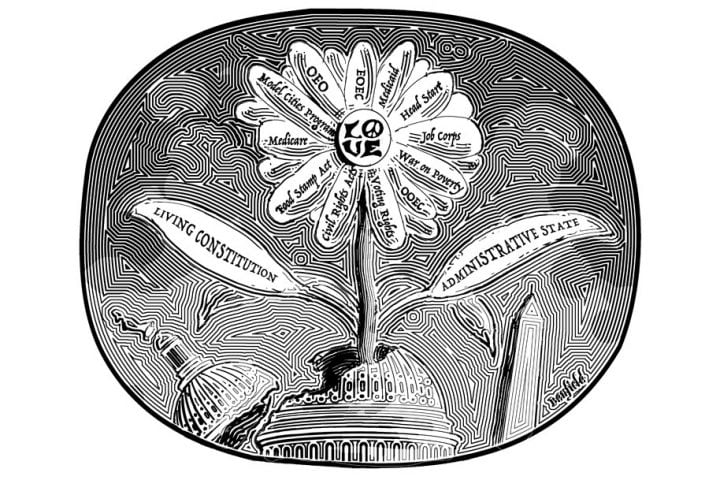Books Reviewed
There is an ambiguity at the heart of identity politics. The term suggests a politics centered on identity, as opposed to, say, class or interest group. So understood, identity politics is a species of tribalism in which all are permitted to assert their identity.
But identity politics can also describe a politics of victimization, guilt, and scapegoating where identity is a mere afterthought reducible to oppression. Understood in this second sense, it is a strange transmogrification of Christianity in which oppressor groups, possessing no identity in which they can take pride, must atone for the inherited sins of their fathers—without, however, any hope of redemption.
Mary Eberstadt’s Primal Screams: How the Sexual Revolution Created Identity Politics is primarily an attempt to understand the tribal version of identity politics. Her provocative thesis is that the collapse of the family brought about by the sexual revolution has created an identity vacuum now filled by identity politics. “Our macropolitics have become a mania about identity,” she writes, “because our micropolitics are no longer familial.”
This short monograph also includes responses by Rod Dreher of the American Conservative, Mark Lilla of Columbia University, and the entrepreneur, investor, and contrarian thinker Peter Thiel, as well as a final rejoinder by the author. Unlike many conservatives who write about identity politics, Eberstadt, a senior research fellow at the Faith & Reason Institute and one of America’s leading cultural critics, is sympathetic to her subjects. She sees “that beneath the noise of identity politics lie authentic hardships.” The primal screams of those who grew up in broken families with few siblings and confused gender roles are real. Deprived of a familial anchor, “people these days are scrambling to figure out who they are.”
* * *
Eberstadt traces the beginnings of the identity crisis to the introduction of oral contraceptives in 1960. Along with other forms of birth control, the pill unleashed the sexual revolution that, in turn, caused “the Great Scattering: the unprecedented familial dispersion, now 60-plus years in the making with no end in sight.” Under this new sexual regime, marriages end on a whim, many fathers are absent or unknown, and childbearing—when it does occur—is often severed from marriage and even sexual intercourse.
Eberstadt aptly summarizes the consequences of this familial liquidation: the lasting trauma of children whose parents divorce, the anxiety and confusion besetting those conceived through anonymous sperm donations, the litany of adverse life outcomes associated with absentee fathers, as well as all the missed socialization opportunities for those who grow up without siblings and cousins. If statistics and studies could persuade, then the case for the traditional family would have long since been closed.
The net effect of the Great Scattering is a scourge of loneliness and emotional impoverishment that no amount of GDP growth or Silicon Valley gadgetry can offset. According to a recent survey cited by Eberstadt, nearly half of all Americans feel lonely “sometimes or always.” Generation Z, not surprisingly, is the loneliest generation of them all.
The Great Scattering has also profoundly unsettled our sense of self. As Eberstadt explains in a passage that captures the crux of her argument:
Who am I? is a universal question. It becomes harder to answer if other basic questions are problematic or out of reach. Who is my brother? Who is my father? Where, if anywhere, are my cousins, grandparents, nieces, nephews, and the rest of the organic connections through which humanity up until now channeled everyday existence?
The four central chapters of the book consist of case studies on white identitarianism, feminism, transgenderism, and the #MeToo movement. Eberstadt shows how these ideologies thrive amidst the confusion and alienation brought about by collapse of the ancien régime of marriage and well-defined gender roles. “Incels” (involuntary celibates) with little prospects of getting married are drawn to the promise of belonging offered by white nationalism. Androgyny grows when traditional—or dare we say, natural—expressions of masculinity and femininity are disparaged. And relations between the sexes become coarser and more predatory when little boys and girls who grew up without fathers take their cues from pornography and society’s noncommittal approach to sex and marriage.
The chapter on feminism is particularly compelling. Contemporary feminism is angry, defiant, and obscene, Eberstadt astutely observes, because its adherents genuinely feel threatened in the unconstrained sexual marketplace and lash out at a hostile world in response. “The furious, swaggering, foul-mouthed rhetoric of feminism promises women what many can’t find elsewhere: protection.”
* * *
Eberstadt acknowledges that familial meltdown is not the only cause of identity politics. Drawing on her book How the West Really Lost God: A New Theory of Secularization (2013), she connects our weakened identity to the decline in organized religion. She also points to other atomizing factors that corrode the strong ties that once bound us together: geographic and class mobility; air travel and mass communication technology; and “the Janus-faced Internet, simultaneously connecting and dividing as never before.”
One wishes she would have gone further in diagnosing the source of the rot. The sexual revolution, for example, was driven by ideas as much as it was by contraceptives. Wilhelm Reich (who coined the term “sexual revolution”), Herbert Marcuse, and other dissident Freudians promoted a new liberationist understanding of human sexuality that swept across society and today reigns unchallenged. Our new self-evident sexual truths—“all consensual orgasms are created equal” and “the more orgasms, the better”—exist independently of the pill.
The sexual revolution is also but one of many reinforcing trends that have destabilized the family. Much of the blame lies with second-wave feminism and its masculine ideal of womanhood, the anti-paternal bias of contemporary family law, the bad incentives of Great Society liberalism and, as both Peter Thiel and Mark Lilla point out in their response essays, changes in the economy that undermine family formation.
As for our identity crisis, it has also been exacerbated by the turn against the nation. One answer to the question “Who am I?” used to be “I am an American,” to which many would add “and damn proud of it!” Today, however, we are more likely to think of ourselves as hyphenated Americans, or even worse, global citizens. Our national historian Howard Zinn has taught us to be ashamed of America’s systemic racism, sexism, and homophobia, thereby eroding our sense of national identity.
* * *
Although Eberstadt’s analysis can help us understand identity politics as the quest for identity, it is less clear how it explains identity politics as the obsession with victimhood and inherited guilt. She posits that “many people today are claiming to be victims because they and their societies are victims—not so much of the ‘isms’ they point to as oppressors, but because the human animal has been selected for familial forms of socialization that for many people no longer exist.”
Why then are the people most obsessed with victimization—elite white liberals—those who have suffered the least from the meltdown of the family? Those who “talk left”—or more correctly, scream left—generally “live right,” as Eberstadt herself observes in passing. The most strident identitarians generally live in the Belmont-type communities of Charles Murray’s Coming Apart (2012), where people get married and stay married. And on issues of identity and race, they are to the left of racial minorities, as Eric Kaufmann, Zach Goldberg, and the authors of the Hidden Tribes report have documented.
The deafening scream of our age is less a heartfelt desire to belong than a neo-puritanical, fanatical desire to rid the world of sin, punish the guilty, and proclaim one’s innocence before all. Ultimately, identity politics is perhaps better understood as a replacement for Christianity rather than for the family. Its main appeal then would lie not in answering the question “Who am I?” but “Why is there evil in the world?”




